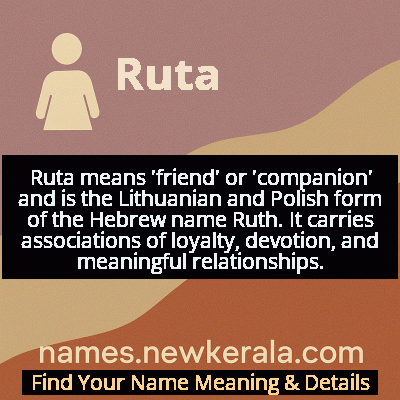Ruta Name Meaning & Details
Origin, Popularity, Numerology Analysis & Name Meaning of Ruta
Discover the origin, meaning, and cultural significance of the name RUTA. Delve into its historical roots and explore the lasting impact it has had on communities and traditions.
Name
Ruta
Gender
Female
Origin
Hebrew
Lucky Number
6
Meaning of the Name - Ruta
Ruta means 'friend' or 'companion' and is the Lithuanian and Polish form of the Hebrew name Ruth. It carries associations of loyalty, devotion, and meaningful relationships.
Ruta - Complete Numerology Analysis
Your Numerology Number
Based on Pythagorean Numerology System
Ruling Planet
Venus
Positive Nature
Harmonious, responsible, caring, and artistic.
Negative Traits
Overly idealistic, superficial, possessive, or jealous.
Lucky Colours
Pink, turquoise.
Lucky Days
Friday.
Lucky Stones
Diamond, turquoise.
Harmony Numbers
2, 3, 9.
Best Suited Professions
Artists, musicians, teachers, healthcare workers.
What People Like About You
Warmth, nurturing nature, artistic flair.
Famous People Named Ruta
Ruta Lee
Actress and dancer
Canadian-American actress known for numerous film and television roles, and her long-standing involvement with the Thalians charitable organization
Ruta Sepetys
Author
Lithuanian-American historical fiction writer whose novels have won multiple awards and been translated into over 30 languages
Ruta Gedmintas
Actress
British actress known for roles in 'The Tudors,' 'The Strain,' and various British television series
Name Variations & International Equivalents
Click on blue names to explore their detailed meanings. Gray names with will be available soon.
Cultural & Historical Significance
In Lithuanian culture, Ruta holds additional significance as it shares its name with the rue plant (rūta), which is a national symbol representing maidenhood, purity, and young womanhood. The plant features prominently in Lithuanian folklore, traditional weddings, and summer solstice celebrations, where young women wear rue wreaths as symbols of their transition to adulthood. This dual heritage—biblical and botanical—gives the name deep cultural resonance across both religious and ethnic traditions.
Extended Personality Analysis
Individuals named Ruta are often perceived as loyal, compassionate, and steadfast companions who value deep, meaningful relationships. They tend to be nurturing figures who provide emotional support and stability to those around them, much like the biblical Ruth's devotion to Naomi. Their friendship is typically characterized by reliability and unwavering support during difficult times, making them the type of person others turn to in crises.
Rutas often possess a quiet strength and resilience that enables them to overcome challenges with grace and determination. They are frequently described as intuitive and empathetic, with an ability to understand others' emotional needs without requiring extensive explanation. While they may appear reserved initially, they form profound connections with those they trust and are known for their practical wisdom and ability to offer sound advice when needed. Their combination of emotional intelligence and inner fortitude makes them natural peacemakers and confidantes in their social circles.
Modern Usage & Popularity
Ruta maintains moderate popularity in Lithuania and among Lithuanian diaspora communities, where it serves as both a connection to cultural heritage and a distinctive alternative to the more common Ruth. The name has seen occasional use in other European countries and North America, particularly among families seeking names with biblical roots but less common than traditional options. While not ranking in most countries' top name lists, Ruta enjoys steady usage and is often chosen for its elegant sound and rich cultural associations. In recent years, there has been growing interest in the name as parents seek unique yet meaningful names with international appeal and historical depth, though it remains relatively uncommon outside Baltic and Polish communities.
Symbolic & Spiritual Meanings
Symbolically, Ruta represents friendship, loyalty, and the bonds that transcend cultural and familial boundaries. Like the biblical Ruth who declared 'Your people shall be my people,' the name embodies the idea of chosen family and unwavering commitment. The connection to the rue plant in Baltic traditions adds layers of symbolism including purity, protection, and feminine wisdom. In herbal lore, rue is associated with clarity, vision, and warding off negative influences, while in Lithuanian culture it symbolizes the transition from maidenhood to womanhood and the preservation of cultural identity. Together, these associations create a rich tapestry of meanings centered around devotion, cultural heritage, personal growth, and the enduring strength found in meaningful relationships.

